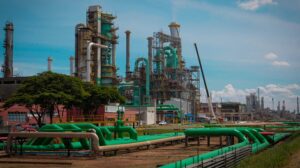In the first week of September, Petrobras’ (Rio de Janeiro, Brazil; www.petrobras.com.br) Henrique Lage Refinery (Revap), in São José dos Campos (SP), conducted tests for the production of sustainable aviation fuel (SAF) from the co-processing of vegetable oil mixed with traditional petroleum streams.
SAF can directly replace conventional kerosene without the need for modifications to aircraft or fueling infrastructure. This makes it a practical and immediate solution to reduce emissions in the aviation sector.

During the test at Revap, vegetable oil was added to the traditional aviation kerosene (QAV) production process. The vegetable oil content in the product reached up to 1.2%, a key milestone in the production of more sustainable aviation fuels. According to Revap’s general manager, Alexandre Coelho Cavalcanti, “this is a lower investment approach for the production of fuels with renewable content, as it uses existing assets,” he noted.
The consolidation of the technological route for SAF production through co-processing is especially relevant to the market, considering the sector’s future requirements. Starting in 2027, airlines in Brazil will be required to use this type of fuel, in line with the Future Fuel Law and the mandatory phase of CORSIA, which is the International Civil Aviation Organization’s (ICAO) program for reducing and offsetting CO₂ emissions from international flights.
According to Petrobras’ Director of Industrial Processes and Products, William França, this advancement represents a technological milestone for Petrobras and an important step for Brazil in the global effort against climate change. “The initiative demonstrates Petrobras’ commitment to innovation and sustainability, preparing to meet the future demands of a more sustainable aviation sector,” said the director.
Recently, the Duque de Caxias Refinery (Reduc), in Rio de Janeiro, obtained authorization from the National Agency of Petroleum, Natural Gas and Biofuels (ANP) to incorporate up to 1.2% of renewable raw material in SAF production. The forecast is that, in the coming months, the refinery will begin production for commercialization.